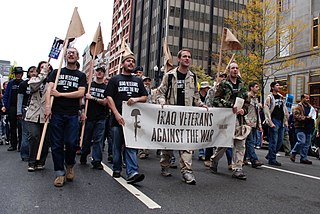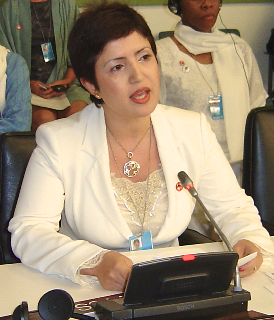Related Research Articles

The United Nations High Commissioner for Refugees (UNHCR) is a United Nations agency mandated to aid and protect refugees, forcibly displaced communities, and stateless people, and to assist in their voluntary repatriation, local integration or resettlement to a third country. It is headquartered in Geneva, Switzerland, with over 17,300 staff working in 135 countries.

The International Rescue Committee (IRC) is a global humanitarian aid, relief, and development nongovernmental organization. Founded in 1933 as the International Relief Association, at the request of Albert Einstein, and changing its name in 1942 after amalgamating with the similar Emergency Rescue Committee, the IRC provides emergency aid and long-term assistance to refugees and those displaced by war, persecution, or natural disaster. The IRC is currently working in about 40 countries and 26 U.S. cities where it resettles refugees and helps them become self-sufficient. It focuses mainly on health, education, economic wellbeing, power, and safety.
The War Resisters League (WRL) is the oldest secular pacifist organization in the United States.

Caresse Crosby was the first recipient of a patent for the modern bra, an American patron of the arts, publisher, and the "literary godmother to the Lost Generation of expatriate writers in Paris." She and her second husband, Harry Crosby, founded the Black Sun Press, which was instrumental in publishing some of the early works of many authors who would later become famous, among them Ernest Hemingway, Archibald MacLeish, Henry Miller, Anaïs Nin, Kay Boyle, Charles Bukowski, Hart Crane, and Robert Duncan.

Opposition to United States involvement in the Vietnam War (before) or anti-Vietnam War movement (present) began with demonstrations in 1965 against the escalating role of the United States in the Vietnam War and grew into a broad social movement over the ensuing several years. This movement informed and helped shape the vigorous and polarizing debate, primarily in the United States, during the second half of the 1960s and early 1970s on how to end the war.

The Raging Grannies are activist organizations in many cities and towns in Canada, the United States, and in other countries. The first group started in Victoria, British Columbia, Canada, in 1986–87.

The Women's International League for Peace and Freedom (WILPF) is a non-profit non-governmental organization working "to bring together women of different political views and philosophical and religious backgrounds determined to study and make known the causes of war and work for a permanent peace" and to unite women worldwide who oppose oppression and exploitation. WILPF has national sections in 37 countries.

Code Pink: Women for Peace is a left-wing internationally active 501(c) organization that describes itself as a "grassroots peace and social justice movement working to end U.S.-funded wars and occupations, to challenge militarism globally and to redirect our resources into health care, education, green jobs and other life-affirming activities." In addition to its focus on anti-war issues, it has taken action on issues such as drone strikes, the Guantanamo Bay detention camp, Palestinian statehood, the Iran nuclear deal, Saudi Arabia, and Women Cross DMZ. Code Pink representatives voiced support for Iran's developing missile technology as a defence against US military bases around Iran.

Veterans for Peace is an organization founded in 1985. Initially made up of US military veterans of World War II, the Korean War, the Vietnam War, the Gulf War, the War in Afghanistan and the Iraq War, and as well as peacetime veterans and non-veterans, it has since spread overseas and has an active offshoot in the United Kingdom. The group works to promote alternatives to war.

Iraq Veterans Against the War (IVAW) is an advocacy group of formerly active-duty United States military personnel, Iraq War veterans, Afghanistan War veterans, and other veterans who have served since the September 11, 2001 attacks; who were opposed to the U.S. military invasion and occupation in Iraq from 2003 to 2011. The organization advocated the immediate withdrawal of all coalition forces in Iraq, and reparations paid to the Iraqi people. It also provides support services for returning veterans to include health care and mental health.

Women Strike for Peace was a women's peace activist group in the United States. In 1961, nearing the height of the Cold War, around 50,000 women marched in 60 cities around the United States to demonstrate against the testing of nuclear weapons. It was the largest national women's peace protest during the 20th century. Another group action was led by Dagmar Wilson, with about 1,500 women gathering at the foot of the Washington Monument while President John F. Kennedy watched from the White House. The protest helped "push the United States and the Soviet Union into signing a nuclear test-ban treaty two years later". Reflecting the era in which the group's leaders had been raised, between the First-wave feminism and the Second-wave feminism movements, their actions and pleas leaned towards female self-sacrifice rather than towards their own self-interests. However, they pushed the power of a concerned mother to the forefront of American politics, transforming the mother from a "passive victim of war to active fighter for peace".

Widad Akreyi is a Kurdish health expert and human rights activist. She has co-founded the human rights organization Defend International and is the author of several books about both health issues and human rights.

A peace movement is a social movement which seeks to achieve ideals such as the ending of a particular war or minimizing inter-human violence in a particular place or situation. They are often linked to the goal of achieving world peace. Some of the methods used to achieve these goals include advocacy of pacifism, nonviolent resistance, diplomacy, boycotts, peace camps, ethical consumerism, supporting anti-war political candidates, supporting legislation to remove profits from government contracts to the military–industrial complex, banning guns, creating tools for open government and transparency, direct democracy, supporting whistleblowers who expose war crimes or conspiracies to create wars, demonstrations, and political lobbying. The political cooperative is an example of an organization which seeks to merge all peace-movement and green organizations; they may have diverse goals, but have the common ideal of peace and humane sustainability. A concern of some peace activists is the challenge of attaining peace when those against peace often use violence as their means of communication and empowerment.

The Granny Peace Brigade [GPB] is an active anti-war demonstration group in New York City made up of older women dedicated to the goal of peace with justice domestically and globally. The GPB frequently collaborates with Code Pink, The Raging Grannies and Peace Action and is one of many local activist groups seeking a safe and peaceful world for all people, especially children.

The Ultimate Confrontation: The Flower and the Bayonet is a photograph of Jan Rose Kasmir, at that time an American high-school student. This iconic photograph was taken by French photographer Marc Riboud. Riboud photographed Kasmir on 21 October 1967 while taking part with over 100,000 anti-war activists in the National Mobilization Committee to End the War in Vietnam's March on the Pentagon to protest U.S. involvement in Vietnam. Seventeen-year-old Kasmir was shown clasping a chrysanthemum and gazing at bayonet-wielding soldiers. The photo was featured in the December 30, 1969 special edition of Look magazine under the title The Ultimate Confrontation: The Flower and the Bayonet. The photo was republished world-wide and became a symbol of the flower power movement. Smithsonian Magazine later called it "a gauzy juxtaposition of armed force and flower child innocence".
The Women's Peace Society was an organized movement that focused on demilitarization in the United States and iniquity of violence. The Women's Peace Society was an active organization for fourteen years, being founded in 1919 and evolving into a separate peace movement-Women's Peace Union of the Western Hemisphere- in 1933. The Women's Peace Society was created on September 12, 1919, in the United States when a group of women that included Fanny Garrison Villard, Elinor Byrns, Katherine Devereaux Blake, and Caroline Lexow Babcock resigned from the executive committee of the Women's International League for Peace and Freedom because they found "a fundamental lack of unity in the membership as a whole and in the executive committee". The leader of the group, Fanny Garrison, Villard sought to bring importance to humanitarian issues and raise awareness for the importance of all lives after the deadly consequences of World War I.
Canadian Voice of Women for Peace, also known as the Voice of Women or VOW, is a Canadian anti-nuclear pacifist organization that was formed in 1960. The organization was created in response to an article in which Lotta Dempsey, a journalist for the Toronto Star, called out for action against the threat of nuclear war and asked women to work together for peace. After the article was published, a group of women contacted Dempsey and formed a women's organization called the Canadian Voice of Women for Peace. The organization's work has spanned multiple decades and is Canada's oldest feminist peace group.
The American Friends Service Committee (AFSC) is a Religious Society of Friends (Quaker) founded organization working for peace and social justice in the United States and around the world. AFSC was founded in 1917 as a combined effort by American members of the Religious Society of Friends to assist civilian victims of World War I. It continued to engage in relief action in Europe and the Soviet Union after the Armistice of 1918. By the mid-1920s it focused on improving racial relations in the U.S., as well as exploring ways to prevent the outbreak of another conflict before and after World War II. As the Cold War developed, it moved to employ more professionals rather than Quaker volunteers, over time attempting to broaden its appeal and respond more forcefully to racial injustice, women's issues, and demands of sexual minorities for equal treatment. They also work for world peace.

An anti-war movement is a social movement, usually in opposition to a particular nation's decision to start or carry on an armed conflict, unconditional of a maybe-existing just cause. The term anti-war can also refer to pacifism, which is the opposition to all use of military force during conflicts, or to anti-war books, paintings, and other works of art. Some activists distinguish between anti-war movements and peace movements. Anti-war activists work through protest and other grassroots means to attempt to pressure a government to put an end to a particular war or conflict or to prevent it in advance.
References
- ↑ Hamalian, Linda (2005). The Cramoisy Queen: A Life of Caresse Crosby. pp. 163–164. ISBN 9786613808301.
- ↑ Lieberman, Robbie (2000). The Strangest Dream: Communisim, Anticommunism, and the U.S. Peace Movement, 1945-1963 (1st ed.). Syracuse, NY: Syracuse University Press. pp. 161, 163. ISBN 978-1-61735-055-9.
- 1 2 "About Us". Women Against War.
- ↑ "Iraqi Refugee Project for the Capital District". Women Against War.
- ↑ "Grannies for Peace". Women Against War.
- ↑ "Women Against War". Facebook.
- ↑ Carty, Victoria (2015). Social Movements and New Technology. Boulder, CO: Westview Press. p. 33. ISBN 978-0-8133-4586-4.